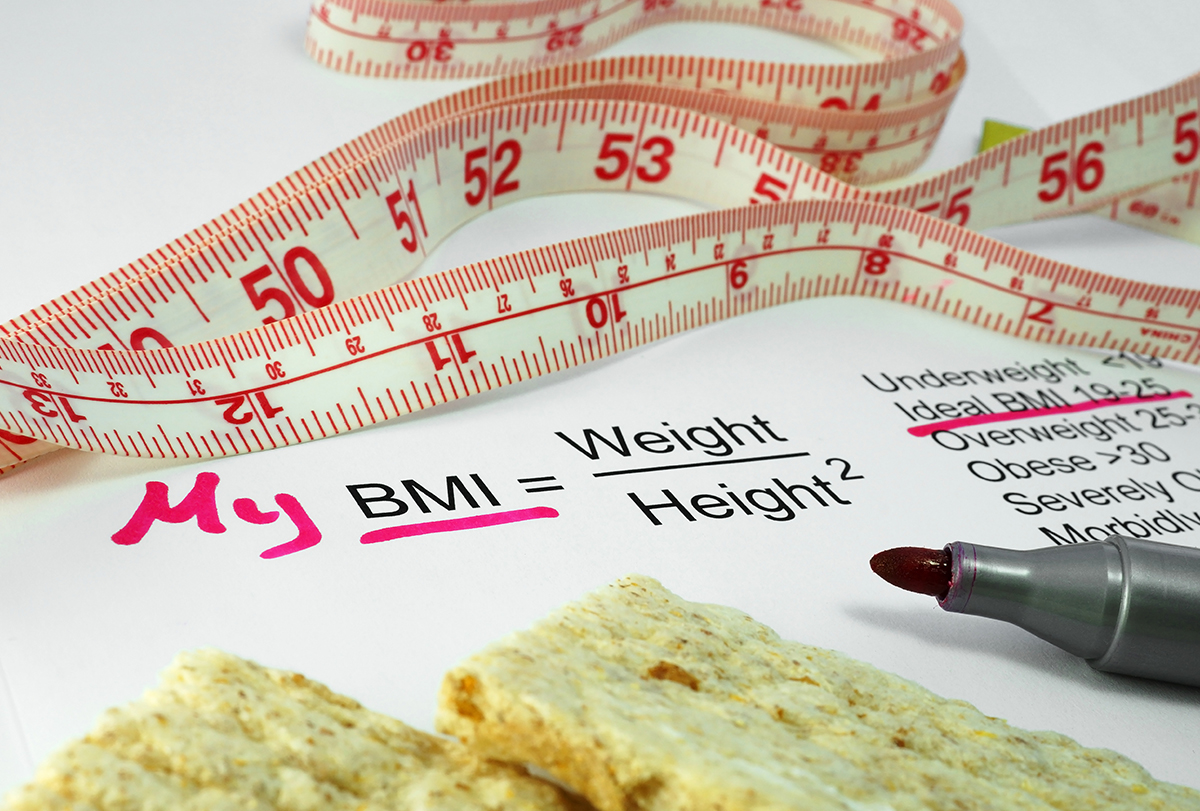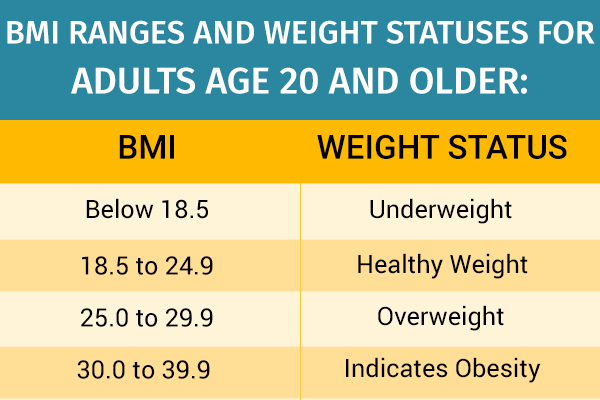In this article:
As a kid, you probably remember your yearly visit to the nurse’s office for an overall checkup. This included an eye test where you read out the letters as their sizes decrease from one line to another, a dental checkup, and a quick measurement of your body weight and height.

If you think more clearly, you’ll be reminded of how these readings were not shared directly but rather in a health report that included your body mass index (BMI).
What is a BMI and why does it matter so much?
What Is Body Mass Index?
BMI was developed in the early 1800s by Lambert Adolphe, a Belgian mathematician. The purpose of his creation of the BMI scale was to scan through populations to identify their degree of obesity for better health management. (1)
Although BMI has been widely used since the mid-19th century to study the health of individuals, Adolphe made it clear that it was only a quick scan of any population’s health status. Today, many countries use BMI as an indicator of the health of their population. (2)
A mathematician, Adolphe developed the BMI scale with a simple formula:
BMI = weight (kg) / height (m2)
You can calculate your BMI, which determines whether your body weight is healthy or not, using BMI calculators available online or by using the above formula. (3)
It is calculated by dividing your weight in kg by the square of your height in meters. For example, if your weight is 56 kg and your height is 1.5 m, then your BMI would be 56/(1.5 x 1.5), which would give you a BMI reading of 24.44 kg/m2.
An ideal BMI range for adults (above 18 years of age) is in the range of 18.5 to 24.9 kg/m2. (2)
In children and teenagers between ages 2 and 18 years, BMI calculation also takes into account gender and age.
Your BMI reading sheds light on your weight and tells if you are obese, underweight, or healthy.

- BMI <18.5 – Underweight
- BMI 18.5–24.9 – Healthy weight
- BMI 25–29.9 – Overweight
- BMI 30–39.9 – Indicates obesity
If your BMI fails to fall under the healthy range, your care provider may prescribe lifestyle interventions and dietary modifications for the betterment of your health.
BMI Myths Versus Facts
People’s limited knowledge of BMI has led them to believe various things that are actually just myths. Here are some myths you need to stop believing.
Myth 1: A low BMI means that you’re very healthy.
FACT: It is common knowledge that people who are overweight or obese or just a bit heavy are more prone to heart issues, high cholesterol levels, lethargy, and diabetes. Since a low BMI means a lighter weight, you might think that having a low BMI would protect you from all these issues.
But this is not true! Researchers have failed to observe any relationship between these chronic diseases and increased BMI. In fact, those with low BMI can still have elevated sugar levels and heart diseases. (4)
Myth 2: A high BMI means you are at risk of a heart attack.
FACT: Obesity is indeed linked to an increased risk of a heart attack. However, as discussed above, a high BMI does not always mean a person is obese or overweight. A high BMI can be due to increased muscle mass, age, or other factors that are missed when calculating the BMI. (5)
Myth 3: Eating healthy will always lower your BMI.

FACT: Muscle weighs more than fat. This means that lifestyle modifications such as following a healthy diet and exercising daily may lead to increased weight and a higher BMI due to increased muscle mass. This is not anything to be worried about. (5)(6)
Myth 4: A BMI between 19 and 25 means you are completely healthy.
FACT: Studies have shown that people who have normal weight according to their BMI but a higher waistline have the same or even higher risk than those who are obese. (7) This means that BMI alone cannot be a standard tool to talk about your health.
So, the next time someone worries about a higher BMI, ask them to get a proper health checkup done to verify their concerns.
Myth 5: BMI means body fat, always.

Muscles are so much denser than body fat. People who are muscular may thus end up weighing a little heavier, resulting in an increase in their BMI. Although they would be considered healthy, because of their high BMI, they’ll still be classified as obese or overweight.
This concern is most notable among boxers, weight trainers, basketball players, and other athletes. (8)
Myth 6: BMI is not related to your ethnicity.
The ethnicity you belong to also plays a major role in deciding what issues you may be at risk of. Ethnicity, again, is not taken into account when calculating your BMI.
So, even if someone shows as healthy on the BMI scale, they may be prone to various diseases. For example, Asians with a healthy BMI still face increased risks of diabetes, high blood pressure, and other heart diseases. (9)
Myth 7: BMI is a good measure of your overall health.
There are various other measurements that should be taken into account when talking about health and wellness. These include:
- Blood pressure
- Allergic levels
- Blood cholesterol levels
- Blood sugar levels
- Heart rate
- Breathing rate
All of them are missed when measuring BMI; thus, BMI cannot be considered a true test of your health and fitness. (10)
Myth 8: BMI is not related to gender.

The formula for calculating BMI is the same for both males and females despite the fact that men have more muscle mass while women tend to have more fat mass. (8)
Myth 9: BMI is not related to age.
Aging causes body fat to increase and muscle mass to decrease. This means that as you age, your BMI is bound to go up. Thus, other ways to assess health and ways to reduce weight need to be considered. (11)
Myth 10: BMI takes into account other aspects of wellness.
In addition to the physical and genetic factors, other aspects that may influence a person’s health are also missed when calculating BMI. (10) These include:
- Mental health
- Dietary habits
- Physical activity
- Social environment
- Daily routine
- Financial factors
Myth 11: BMI is not related to body type.
The type and location of fat in the body also affect your health, but this is ignored when calculating the BMI.
When your fat is stored in your belly, around your stomach, you have an apple or android body type. When fat is stored in the thighs and hips, you are said to have a pear-shaped body.
While BMI cannot predict the patterns of fat storage in the body, other methods such as the DXA body scan or CT scans can help. (12) Studies have shown that apple-shaped bodies are more prone to health issues than pear-shaped bodies. (12)
Most-Asked Questions About BMI
What are some alternatives to BMI?
There are many alternatives to BMI that may be more successful at calculating disease risk. These include:
- Waist-to-height ratio
- Resting heart rate
- Waist circumference
- Skinfold measurement
Is BMI officially recognized?
Yes, BMI is officially recognized by WHO, which has led to its wide and extensive use in private and public healthcare sectors.
Should I talk to my doctor about my BMI results?

It is always good to let your doctor know about anything that is concerning so timely steps can be taken to prevent risks. BMI readings can be indicative, even if not completely assertive, of various chronic issues.
How accurate are BMI readings?
BMI is used by many healthcare providers as a health assessment tool. It has become a go-to test for identifying a person’s health status solely based on the size of their body.
The issue with BMI is that it tends to oversimplify health measurements. Due to this, many people have started to think of BMI as an outdated concept that is not very accurate in defining their health or fitness.
This is mainly because it does not take into account important factors that influence health, such as:
- Age
- Gender
- Genetic makeup
- Body fat
- Muscle mass
- Bone density
Even though these concerns remain true, there are many studies that have shown that people with a BMI reading that is lower or greater than a healthy BMI have a greater risk developing of chronic issues and suffering from early death. (13)(14)
- Was this article helpful?
- YES, THANKS!NOT REALLY


